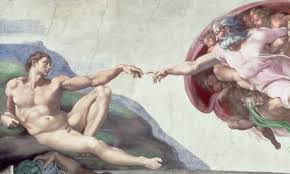Second Sunday in Ordinary Time “Behold the Lamb of god” (JN. 1,35)
“A lot of church- going people never really got baptized.”
This sentence from a very provocative article written by a Catholic priest startled me.
What he was proposing was that we Catholics, we Christians in general, are seldom truly baptized people. Yes, he admits, we’ve all gone through the ceremony. We’ve had the water poured over our heads. We’ve celebrated afterwards with our families. But, then, he insists, way too many of us have gone on living our lives pretty much like everyone else. No real difference can be observed.
Here’s how he put it:
“True baptism is that moment when you get it, when you understand what your life’s purpose really is, when you get your meaning, when you wake up one morning and you say to yourself: ‘I think I know what I was created for.’”
He goes on to say that true baptism is different from living life on “cruise control.” It’s different than just going through the motions of living: growing up, going to school, getting married, having children, getting a job. All of these are very important moments and valuable achievements in a person’s life.
But often they are just door – openers to life’s next stage of “cruise control” living.
His point is that often people never allow themselves to fall into that surrender that creates a different set of eyes through which they can see a deeper meaning to “what it’s all about.”
The kind of baptism he’s talking about most often does not come in moments of achieving greatness. It usually happens when we are faced with experiences of failure, of abandonment, betrayal, rejection, loss, deep hurt – of sin.
The good news is that this kind of pain can bring gain – if we allow ourselves to be taught by it; if we allow ourselves to surrender our egos and fall to our knees; if we allow ourselves to enter into a deeper experience of God and of our own selves and our marriages and our values.
When that happens, we are in effect joining Jesus in his plunge into the river Jordan, or, like St. Paul, falling from our horse of power and self-sufficiency on our own “road to Damascus.”
Clearly, this author is trying to make the point that true baptism involves much, much more than a ceremony of pouring water. True baptism happens when you discover your soul and begin living out of that experience. It’s when at last you surrender wholly to the magnitude of God’s love and allow it to be the deepest meaning of your life.
That’s when you are baptized.
That’s also exactly what happened to the man named Jesus. He was 30 years old at the time. He’d lived a bit, perhaps failed a bit. And then “it” happened.
The gospel writers Matthew, Mark and Luke tried to communicate this major transformation within Jesus by describing the opening of the heavens and the overshadowing by a dove and the words “This is my beloved Son in whom I am well pleased” issuing from the clouds.
In today’s gospel, John does the same, but then adds something very different. He says John the Baptist gave Jesus a title not found anywhere else in the entirety of the gospels:
Lamb of God.
This signature tells us about the kind of God with whom Jesus has become fully united. This God is not to be viewed in terms of power or majesty or might or splendor; not a God to be addressed in terms of awe and wonder and unapproachable grandeur; and certainly not a God to be identified with violence, retribution and revenge.
Instead, God is to be seen as a lamb: gentle, meek, tender.
God is to be seen as the lamb who opposes the misuse of power, as the sacrificial lamb who understands our pain, as the lamb led to slaughter who has endured our sufferings and joined us in our agonies and anxieties and betrayals and terrors.
God is the lamb who died on a cross so that we might live as fully as possible.
Jean Vanier, the renowned founder of L’Arche, an international network of communities for people with intellectual disabilities, perhaps described the consequence of Jesus’ baptism best when he wrote a poem-like piece called The Lamb of God. Here are a few of his words:
In front of the power and armies of Caesar, in front of their mighty weapons, stands a lamb, the Lamb of God. This lamb will break down the walls of fear, of aggression, of violence, of sin which imprison people in themselves and incite them to seek their own glory.
This lamb will liberate in each person a new life of communion with God, with other people and with what is deepest in the self, sowing seeds for universal peace.
When Jesus comes, he comes not as a spectacular God of power, but as a gentle lamb, the Chosen One of God, the Beloved.
He comes into that part of our being that is our treasure, that sacred space within us, hidden under all the fears, walls and anger in us so that we may grow in the spirit of love.
Yesterday, as today, John the Baptist is calling people to be attentive to the quiet voice and presence of Jesus, calling us to trust him and to enter into friendship with him. We are being called to be gentle followers of the Lamb, not people of power.
What Vanier is saying here is what happens to us when we allow ourselves to be immersed in the water and in the fire of the Spirit, when we allow ourselves to be truly baptized.
What it does is make us into “gentle followers of the Lamb.”
Ted Wolgamot, Psy.D.





